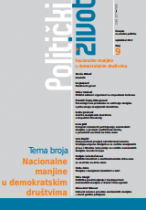Pad demokratije i redukcija ljudskih prava i sloboda u vreme pandemije: slučaj Srbija
The decline of democracy and the reduction of human rights and freedoms during the pandemic: the case of Serbia
Author(s): Slaviša OrlovićSubject(s): Politics / Political Sciences, Political Sciences, Civil Society, Governance
Published by: Fakultet političkih nauka Univerziteta u Beogradu
Keywords: Pandemic; Coronavirus; democracy; authoritarian tendencies; autoritarne tendencije; human rights and freedoms; state of emergency;
Summary/Abstract: The coronary virus pandemic (COVID 19) has further strengthened authoritarian tendencies and reduced human rights and freedoms. In Serbia, it is disputable that the decision on the state of emergency was not made by the parliament, it came to deparliamentarization and even greater supremacy of the executive. The introduction of the state of emergency was followed by the adoption of 38 decrees and conclusions of the government and the President of the Republic. Restrictive and repressive measuresand limited rights and freedoms of citizens were introduced. The decline in trust was accompanied by stricter measures, arrests, repressive measures and the most terrible threats. The opposition was not consulted in the adoption of measures, it did not have the opportunity to appear in public. During the state of emergency, there was an inadmissible action of the judicial authorities, the trial via Skype and the verdict that self-isolation was not respected upon return from abroad „despite the appeals of President Vučić broadcast on television”. Media control and pressure on journalists has been strengthened: by arresting journalists, reducing the provision of information on the epidemic to the Crisis Staff, and holding a press conference without journalists. Discriminatory treatment of pensioners, children with autism and other disabilities, pets, etc. The rule of fear has intensified. The existential fears so far have been further strengthened by the fear of death, disease and repressive measures. The rule of fear is not a feature of democratic regimes. At the time of the pandemic, the divisions in society that existed before the pandemic deepened even more: a boycott of parliament, a commitment to boycott elections and protests. The decision to lift the state of emergency was made in the shadow of the decision on the new election date, June 21. 2020. Democratic norms, values and institutions must be preserved even in times of crisis, because power without control is like a car without brakes. A state of emergency accustoms people to submission. After the pandemic and after 53 days of the state of emergency, a great effort will be needed to reanimate society, and probably „mechanical breathing” for democracy. One of the most important transfers in the history of democracy was the transfer of power from the individual to the institutions. The reverse process, that is underway, must be stopped!
Journal: Politički život
- Issue Year: 2020
- Issue No: 18
- Page Range: 81-99
- Page Count: 9
- Language: Serbian

